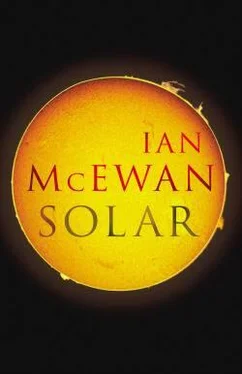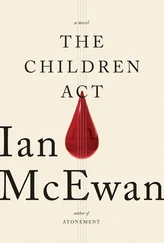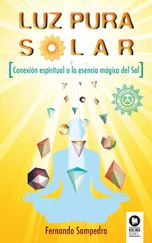He stood at last and paused, wondering if there were a simple mistake he was making. Not so far. He put the hammer and the comb and kitchen towel in the bag and went to the front door. Still wearing the gloves, he walked unhurriedly down the garden path and stopped by the gate to look around. There was no one about. He took out the hammer and tossed it into the shrubbery by the front wall, and then went back into the house, removed the gloves and put them in with the apple core, comb and kitchen roll, then folded the bag carefully, so its bloodstained handles were not exposed, and shoved it into an outer zip compartment of his suitcase.
As far as he could tell, there was no blood on his person, his clothes or his shoes. He took his luggage and the tool bag and stepped outside, pulling the front door closed with his foot. The unending gentrification of Belsize Park ensured that he found a skip within a few hundred yards. He dumped the tool bag. Within several minutes he was on Haverstock Hill getting into a cab bound for Portland Place.
He assumed that his state of affectless calm was due to shock and would wear off soon. Before it did he hoped to bump into someone who would recognise him. The taxi dropped him outside the Institute of Physics – he had once been a vice-president – and before going in he found a litter bin and disposed of the plastic bag. Inside the Institute, it was more or less as he had hoped. He had some minor business there and got into conversation with one of the administrators, who knew who he was. Beard mentioned that he had been in Spitsbergen, and then, casually, that he had come straight from Heathrow by cab and had been caught up in a traffic jam. The administrator commiserated. He agreed to keep an eye on the suitcase while Beard went to the British Library.
In the cab to the Euston Road his legs, independently of the rest of his body, began to shake. But he crossed the Library’s forecourt like any other scholar, penetrated the building and found a carrel. He called up some papers – historical material relating to a lecture he was due to give – and sweated it out for several hours, waiting for the time, around four fifteen, when he would feel his phone vibrate in his pocket.
Hunched over his documents, he read nothing, but he forced himself to write out some notes. It amazed him, what had happened. Each time he thought about it, it was as if for the first time. He marvelled at what he had done and how he had acted so calmly, without reflection, behaved like a murderer covering his tracks, while obliterating the truth that could have saved him. He was now in deep, the sole witness of his own innocence. In effect, he had panicked, even while he had felt clear-headed. What did he know of forensics? It was at least possible that today’s fresh fingerprints, the ones that were his, were notably different from the ones he had left around the house the weeks and months before. In which case, they would be able to tell that he had been in the house that morning and he would become a suspect.
What other mistakes had he made, what unseen neighbours had observed from a window his arrival or departure? Or seen him throw something into the skip? Was he right to have brought the tool bag away with him? When he was kneeling over Aldous a torrent of his own skin flakes and hair and other microscopic compounds might have poured over the boy, over the dressing gown. But it was his own dressing gown, already filled with the organic traces of his own existence. Not so bad then. If the house was filled with his marks, they were his cover. But only if a fingerprint could not be dated. Somewhere in this building, in the stacks, were a thousand books that could tell him, and he dared not call one up. It would make no difference now if he did.
At three fifty he stood stiff-kneed from his carrel and went to wait in the Library’s café for the call he knew must come. He spent the time preparing himself by trying to remember what it was he was not supposed to know: that Aldous was in the house, that he was Patrice’s lover, that he was dead. There might have been a fourth detail he needed to appear ignorant of, and he was too fretful to recall it. There may even have been a fifth. It was not so easy to concentrate, for the venerable Library and its environs were not quite as hushed and serious as they once were. There were scores of kids, undergraduates, in the café. Their coats and backpacks were piled up in the spaces between the tables, and they wandered the public spaces, the wide staircases, laughing and talking at a relaxed, normal pitch. Perhaps this was some form of open day for schools. The atmosphere was of a student-union building in a modern university – a bar, a pinball machine, table football would not have been out of place. It suited Beard well to feel obscure among the crowds, but he almost missed the call when it came, an hour late by his calculation, and he still had not remembered the fourth and fifth things he should pretend not to know. He had to trust himself and assume they did not exist.
Patrice said, ‘Where are you?’ Her voice was flat, and despite everything, he could not restrain a certain foolish hope: at last, she cared about his whereabouts.
He told her, and then he said, ‘What’s up?’
‘The police are here. You’ve got to come home.’
He said, ‘Patrice, what’s going on?’
She had put her hand over the receiver. He heard the murmur of a man’s voice, and then she said, ‘Just come back now.’
‘Have we had a break-in?’
There were more voices around her. Dozens of people were in the house. She was starting to repeat herself in the same toneless voice when she gave out a sudden cry as if stabbed in the arm, and half shouted, half wailed, ‘It’s Rodney, he’s killed someone…’ and a man’s voice cut in over her saying, ‘Mrs Beard…’ and then the line went dead.
Beard went back to his carrel to gather up the notes he had taken the trouble to write out, then he hurried across the Library court, past Paolozzi’s Newton, and it was only when he was on the street, raising his arm for a taxi, that he remembered what he had decided hours before: it would look better to arrive home with his suitcase. He had the taxi wait in Portland Place while he went into the Institute to thank the administrator. On the way to Belsize Park, Beard wondered whether this – not dashing straight home, but making the detour to collect his luggage – was one of those items, that fourth or fifth thing he was supposed to remember. He could not think it through.
* * *
He was interviewed at length on four occasions, and his last account did not waver from the first. Under the sustained pressure of police interrogation, honesty is a fine, unassailable thing, and as a man of science, Beard had an automatic respect for internal consistency. The truth was impregnable. No need to remember what he had said last time when he could return to the source. So yes, his early flight from Oslo brought him into Heathrow at eight. He went straight to the taxi line, and then – this was his only fiction, the rest was mere omission – he was caught up in a long delay on the M4 and did not get to Portland Place until the mid morning. But he had taken many taxis from Heathrow before, and had been in many traffic jams, and memory was wax-soft, and soon his construction formed itself in his mind like any genuine recollection, both vague and certain. He really felt he had lost an hour in the traffic. What did he do during that long taxi journey? He read a paper for peer review. Total concentration. He did not look up to see the pile-up in the middle or fast lanes, or wherever it was. The rest was hard truth – his business at the Institute, his day’s work at the Library, interrupted at last by Patrice’s call when he happened to be taking a break. With painful honesty he acknowledged that he knew about and had been upset by his wife’s affair with Mr Tarpin. But he, Beard, had had many affairs himself, and that, regrettably, was the kind of marriage they had, and probably it was coming to an end. He did not stray from the truth as he described Patrice’s black eye, his Sunday-morning visit to Cricklewood, the confrontation and the slap in the face, and how he, unused to violence, had hurried away for his own safety. Though it embarrassed him, he gave the detective inspector a thorough description of the afternoon he introduced Tom Aldous to his wife, and no, he did not notice anything pass between them, and no, he never suspected that while he, Beard, was in the Arctic, and, who knew, perhaps months before, Patrice was making love to Aldous. And yes, of course he knew the boy, a brilliant young scientist who often picked him up from Reading station. No, not obviously likeable. Too self-obsessed, too narrow, too awkward in company. But many people were like that in his field.
Читать дальше












